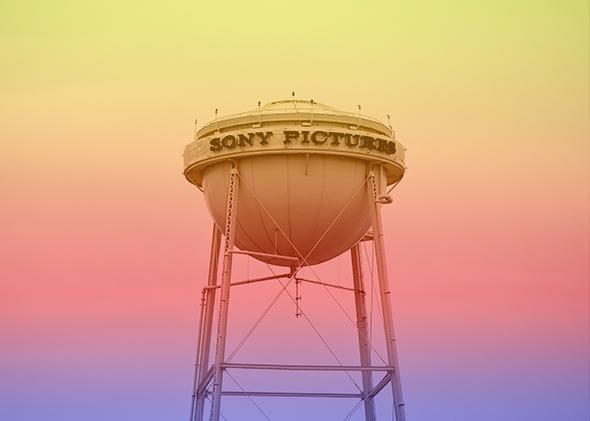If you report on the data from the Sony hack, the terrorists win. That, essentially, was the premise of Aaron Sorkin’s recent op-ed in the New York Times. By running stories gleaned from files leaked by hackers, the media are “giving material aid to criminals,” Sorkin says. “I’m not crazy about Americans calling other Americans un-American,” the screenwriter wrote, “so let’s just say that every news outlet that did the bidding of the [hacker group] Guardians of Peace is morally treasonous and spectacularly dishonorable.”
While President Josiah Bartlet would no doubt agree with Sorkin’s take, I’m a bit more skeptical. I’m also not buying this argument from director Judd Apatow:
Documents that illuminate the inner workings of a multibillion-dollar corporation are, in fact, not the same as leaked photos of a naked woman. Even if the leaker’s intent in both instances is to embarrass or intimidate, a good reporter can differentiate between leaks that target individuals and ones that target institutions. The Jennifer Lawrence photos have no news value—they are merely of prurient interest. The Sony leaks shed light on an industry that affects millions of people worldwide.
Nevertheless, there’s a case to be made that journalists publishing information from these leaks are abetting an “act of censorship, directed at Sony.” That’s what Jacob Weisberg argues in a Slate piece entitled “Stop Publishing the Sony Hacks.” The most popular explanation of the hack is that the Guardians of Peace are North Korean affiliates who attacked Sony Pictures because of the impending release of The Interview, in which Seth Rogen and James Franco play two sloppy man-children sent to assassinate Kim Jong-un. On Wednesday, Sony canceled the movie’s release and the New York Times reported that “American intelligence officials have concluded that the North Korean government was ‘centrally involved’ in the recent attacks.” Write stories culled from Sony’s private data, the argument goes, and you’re giving these North Koreans what they want.
To what extent are journalists obligated to care about the motives of a leaker or hacker? After all, journalists deal with odious sources all the time, and every reporter knows that no one leaks from neutral ground. But, obviously, there are agendas and then there are agendas. There’s a difference between the motives of NSA leaker Edward Snowden and those of criminal hackers who were likely compensated by North Korea to make Sony pay for the crime of releasing a dumb James Franco movie. One party wants to reform the government, while the other wants to bring down, or at least humiliate, a corporation that made a movie it found offensive.
But just because the Sony data may have been released for one reason doesn’t mean that reporters can’t use it for another. Journalists don’t have to support the source of the information or the means by which it was acquired to believe that it has news value. And the information released by the Sony hackers does indeed have news value.
Is it newsworthy that Sony executives have exchanged vaguely racist emails in private? Yes, it is—these are the people who determine which movies get made and who stars in them, and it’s reasonable to wonder whether opinions exchanged in private affect their public-facing decisions. Is it newsworthy that there are race and gender discrepancies in pay in Hollywood, as Fusion has reported? Yes, it is. Gawker has used the leaks to report on how Sony may have mustered influence to kill stories in the New York Times. The Verge used the leaks to report on how, after the Stop Online Piracy Act died in 2012, movie studios and the Motion Picture Association of America changed tactics in their war against pirated content, in an initiative dubbed “Project Goliath.” These are all legitimate stories, and they’re all stories that we wouldn’t have if not for the leaks.
Sorkin is willing to concede that hacked or stolen data is fair game in certain cases. “I understand that news outlets routinely use stolen information. That’s how we got the Pentagon Papers, to use an oft-used argument,” he writes. “But there is nothing in these documents remotely rising to the level of public interest of the information found in the Pentagon Papers.”
Well, duh. But “on the same level as the Pentagon Papers” shouldn’t be the baseline standard for newsworthiness, or even the baseline standard for whether a news outlet should go with leaked information. Emails between Sony Pictures executive Amy Pascal and producer Scott Rudin aren’t exactly the diplomatic cables released via WikiLeaks. But the “public interest” doesn’t just concern matters of national security and public policy. Reporters too often create a false hierarchy that differentiates between hard news and fluff, with the latter dismissed as the province of trade newspapers and gossip rags. In reality, Sony is a megacorporation that exerts significant control over a wide swath of American culture. The movies released by Sony have broad influence. Documents that reveal the company’s behind-the-scenes decision-making are important and interesting.
Sure, not all of the reporting that has come out of the Sony leaks is newsworthy. Take, for example, Gawker’s report that Paul Reiser emailed Sony asking why more seasons of Mad About You hadn’t yet been released on DVD. If I were the editor of Slate—patience, Peters, climb the ladder—I probably wouldn’t have published that piece, the only point of which was to make fun of Paul Reiser. But I don’t think it’s a moral abomination, either. Different publications rightly have different standards, and publishing an email about a business deal is never akin to publishing a nude photo.
It is a journalist’s job to assess the news value of whatever comes across his desk. Take that choice away, and the American media becomes that much more constrained and that much less effective as a watchdog. The Sony hack has embarrassed a lot of celebrities and studio executives. It would be a lot more embarrassing if the press were more concerned with Hollywood’s discomfort than with doing its job.
